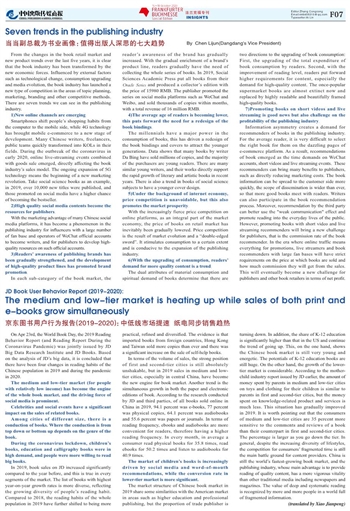By Chen Lijun(Dangdang's Vice President)
From the changes in the book retail market and new product trends over the last fve years, it is clear that the book industry has been transformed by the new economic forces. Influenced by external factors such as technological change, consumption upgrading and media evolution, the book industry has launched a new type of competition in the areas of topic planning, marketing, branding and other competitive methods. There are seven trends we can see in the publishing industry.
1)New online channels are emerging.
Smartphones shift people’s shopping habits from the computer to the mobile side, while 4G technology has brought mobile e-commerce to a new stage of development. Many Chinese writers, freelancers, public teams quickly transformed into KOLs in their fields. During the outbreak of the coronavirus in early 2020, online live-streaming events combined with goods sale emerged, directly affecting the book industry’s sales model. The ongoing expansion of 5G technology means the beginning of a new marketing revolution. Take social science books as an example, in 2019, over 10,000 new titles were published, and those promoted on social media have a higher chance of becoming the bestseller.
2)High quality social media contents become the resources for publishers.
With the marketing advantage of many Chinese social media platforms, it has become a phenomenon in the publishing industry for infuencers with a large number of fan base and operators of WeChat official accounts to become writers, and for publishers to develop high-quality resources on such ofcial accounts.
3)Readers’ awareness of publishing brands has been gradually strengthened, and the development of high-quality product lines has promoted brand promotion.
In each sub-category of the book market, the reader’s awareness of the brand has gradually increased. With the gradual enrichment of a brand’s product line, readers gradually have the need of collecting the whole series of books. In 2019, Social Sciences Academic Press put all books from their Oracle Series and produced a collector’s edition with the price of 15980 RMB. The publisher promoted the series on social media platforms such as WeChat and Weibo, and sold thousands of copies within months, with a total revenue of 16 million RMB.
4)The average age of readers is becoming lower, this puts forward the need for a redesign of the book bindings.
The millennials have a major power in the consumption of books, this has driven a redesign of the book bindings and covers to attract the younger generations. Data shows that many books by writer Da Bing have sold millions of copies, and the majority of the purchasers are young readers. There are many similar young writers, and their works directly support the rapid growth of literary and artistic books in recent years. There is also a trend in books of social science subjects to have a younger cover design.
5)Under the background of internet economy, price competition is unavoidable, but this also promotes the market prosperity.
With the increasingly fierce price competition on online platforms, as an integral part of the market economy, the price of books on retail market has inevitably been gradually lowered. Price competition is the result of market evolution and a “double-edged sword”. It stimulates consumption to a certain extent and is conducive to the expansion of the publishing industry.
6)With the upgrading of consumption, readers’ demand for more quality content is a trend.
The dual attributes of material consumption and spiritual demand of books determine that there are two directions to the upgrading of book consumption: First, the upgrading of the total expenditure of book consumption by readers. Second, with the improvement of reading level, readers put forward higher requirements for content, especially the demand for high-quality content. The once-popular supermarket books are almost extinct now and replaced by highly readable and beautifully framed high-quality books.
7)Promoting books on short videos and live streaming is good news but also challenge on the proftability of the publishing industry.
Information asymmetry creates a demand for recommenders of books in the publishing industry.For the average reader, it is very difficult to select the right book for them on the dazzling pages of e-commerce platform. As a result, recommendations of book emerged as the time demands on WeChat accounts, short videos and live streaming events. These recommenders can bring many benefits to publishers, such as directly reducing marketing costs. The book information can be spread to the customer side more quickly, the scope of dissemination is wider than ever, so that more good books meet with readers. Writers can also participate in the book recommendation process. Moreover, recommendation by the third party can better use the "weak communication" effect and promote reading into the everyday lives of the public. However, promoting books with short video and live streaming recommenders will bring a new challenge for publishers, that is the commission rate of the book recommender. In the era where online traffic means everything for promotions, live streamers and book recommenders with large fan bases will have strict requirements on the price at which books are sold and how much commission they will get from the sales. This will eventually become a new challenge for publishers and other book retailers in terms of net proft.


